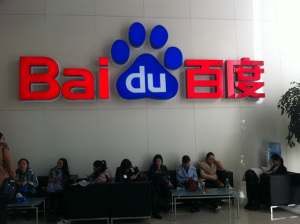Baidu Looks To Alternate Options For Growth

Photo credit: Jon Russell/Flickr.com
Baidu’s (Nasdaq:BIDU) woes, driven by regulatory issues in China, continue to hurt its performance. While the company’s recent result announcement exceeded market expectations, this was the first time ever that it reported declining revenues. The market is obviously not thrilled.
Baidu’s Financials
For the third quarter of the year, Baidu’s revenues fell 0.7% over the year to RMB 18.3 billion (~$2.74 billion), ahead of the market’s forecast of $2.59 billion. EPS of $1.49 was also ahead of the market’s forecast of $0.87 for the quarter.
By segment, revenues from Online Marketing services fell 7% over the year to RMB 16.49 billion (~$2.473 billion) with active online marketing customers declining 16% to 524,000. Revenue per online marketing customer grew 11% over the year to RMB 31.300 (~$4,694). Revenues from Other services contributed the remaining RMB 1.8 billion (~$0.27 billion).
Among operating metrics, mobile search monthly active users (MAUs) grew 3% over the year to 660 million and mobile maps MAUs grew 7% to 348 million for September 2016. Gross merchandise value for Transaction Services conducted on Baidu’s platform grew 49% to RMB 19.4 billion (~$2.9 billion). Baidu Wallet activated accounts grew 99% to 90 million at the end of the quarter. Mobile continued to be a big driver for growth. During the quarter, mobile revenue accounted for 64% of the quarter’s revenues compared with 54% a year ago.
For the current quarter, Baidu expects revenues of $2.68 billion-$2.76 billion, falling short of the Street’s expected revenues of $2.89 billion. The disappointing outlook sent Baidu’s shares down 7% post result announcement.
Baidu’s Focus Areas
Baidu’s weakening revenues are attributed to the higher regulatory requirements imposed by Chinese authorities. New Chinese laws ban advertising of tobacco and prescription medicines in the country. To help meet these stricter norms, Baidu has been implementing stricter standards for online marketers that has resulted in a 16% fall in the number of advertisers on Baidu’s platform. But Baidu is not very worried. It is focusing on improving its financial model by cutting down spending on loss-making businesses and investing in other alternate revenue opportunities.
For instance, Baidu is cutting spending on its food delivery arm Waimai. Waimai offers customers the ability to get food ranging from Starbucks coffee to sliced sashimi delivered using Waimai’s scooters. To attract customers and restaurant partners, the service has had to offer several subsidies. The food delivery market in China is seeing strong competition. Another Chinese giant Alibaba invested $1.25 billion in Waimai’s competitor Ele.me to gain stronger foothold in the market. But strong competition and low margins are also driving others away. Earlier this year, Germany-based Delivery Hero decided to abandon plans to grow in China due to these concerns. Given the pressure on costs, Baidu has decided to pare subsidy spending on Waimai.
It is also increasing efforts in developing its news feed service which has seen higher traffic during the last quarter. Baidu did not disclose metrics, but it claims that the news feed has attracted and retained many mobile device users. The news feed service has been customized to the user’s choice by analyzing their search history to offer news on topics that the user may be interested in. The customization has helped improve traffic by nearly twenty times during the quarter.
Finally, like others in the area, Baidu is investing in artificial intelligence (AI) capabilities and products. It is working on the development of products such as smart voice-based secretaries like Siri and self driving cars. During the quarter, Baidu set up two funds, Baidu Venture and Baidu Capital, which will focus on investing in projects in artificial intelligence and other Internet sub-sectors.
Its stock is currently trading at $171.56 with a market capitalization of $59.5 billion. It touched a 52-week high of $217.97 in November last year. It had fallen to a 52-week low of $139.61 in February this year.
More investigation and analysis of Unicorn companies can be found in my latest Entrepreneur Journeys book, more



